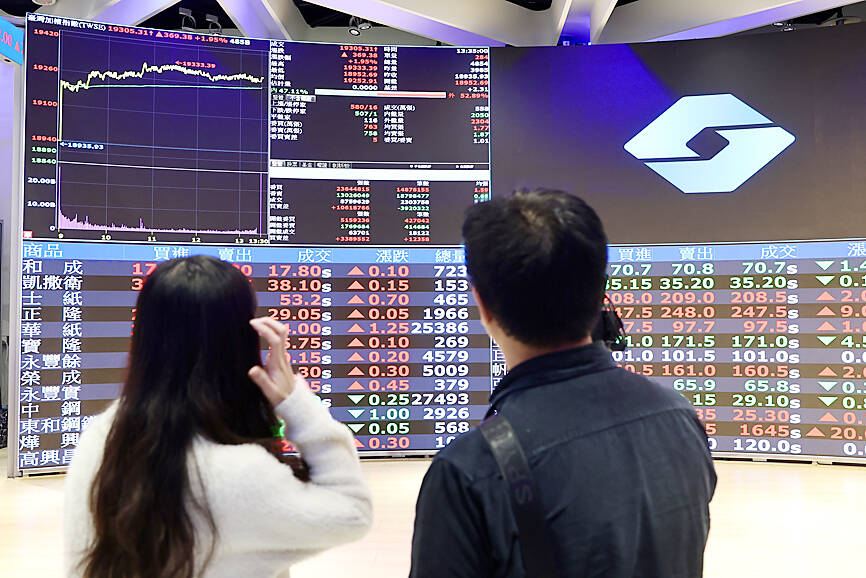Taiwan Semiconductor Manufacturing Co (TSMC, 台積電) stock yesterday rose to its highest-ever level, tracking a global rally in chip stocks fueled by optimism about artificial intelligence (AI) and helping the TAIEX add nearly 2 percent.
The world’s top chip foundry increased 5.22 percent to close at NT$725 in Taipei trading, a record since its stock listing in 1994. The surge lifted its market capitalization to US$597 billion, one step closer to reclaiming a spot in the world’s 10 most valuable companies.
TSMC has soared more than 22 percent so far this year, helping the local benchmark TAIEX also reach a record high, ending up 1.95 percent at 19,305.31 yesterday, Taiwan Stock Exchange (TWSE) data showed.

Photo: CNA
Turnover on the main board totaled NT$485.383 billion (US$15.39 billion), the second-largest since Feb. 15, when turnover was NT$492.695 billion, while three major institutional investors were net buyers of Taiwanese equities, purchasing a net NT$44.48 billion in local stocks yesterday, TWSE data showed.
The gains in Taipei followed a strong Wall Street performance on Friday, with the S&P 500 and the tech-rich NASDAQ ending at all-time highs off continued momentum for AI-linked equities, especially Nvidia Corp, which finished with a valuation above US$2 trillion for the first time.
TSMC, the main supplier to Nvidia and Apple Inc, is considered a key beneficiary of the ongoing AI boom, with its executives expecting a return to solid growth this quarter amid signs of a demand recovery. Nvidia’s upbeat results last month further cemented investor optimism about the sector.
Separately, Japan’s benchmark Nikkei 225 index yesterday surpassed 40,000 points for the first time, with analysts predicting it could advance even further, lifted by Wall Street rallies, robust corporate earnings and optimism over AI.
Shares in Japan have also been boosted by continued easy credit policies, with the Bank of Japan pumping money into the economy to help support growth.
The Nikkei 225 index rose as high as 40,314.64, but fell back slightly. It gained 0.5 percent to close at 40,109.23, having risen for five weeks straight.
Tech darling Tokyo Electron Ltd rose 2.4 percent yesterday and has surged over 50 percent since the start of the year.
Elsewhere in Asia, Hong Kong finished flat yesterday and Shanghai closed higher ahead of the start of China’s annual legislative conclave.
At the rubber-stamp parliamentary meeting, leaders are expected to set an annual growth goal of about 5 percent for this year, SPI Asset Management managing partner Stephen Innes said.
Seoul, Mumbai, Manila and Kuala Lumpur were also up, while Sydney, Wellington, Jakarta and Singapore were down.
The solid performance of global markets provides “favorable trade winds for Asian markets as the new week begins,” Innes said.
Hope for US interest rate cuts, indications of cooling inflation and a soaring passion for AI within the tech sector have driven investor sentiment, he said.
“These factors collectively contribute to the positive tone in global markets, which is expected to bolster Asian markets,” Innes added.

KEEPING UP: The acquisition of a cleanroom in Taiwan would enable Micron to increase production in a market where demand continues to outpace supply, a Micron official said Micron Technology Inc has signed a letter of intent to buy a fabrication site in Taiwan from Powerchip Semiconductor Manufacturing Corp (力積電) for US$1.8 billion to expand its production of memory chips. Micron would take control of the P5 site in Miaoli County’s Tongluo Township (銅鑼) and plans to ramp up DRAM production in phases after the transaction closes in the second quarter, the company said in a statement on Saturday. The acquisition includes an existing 12 inch fab cleanroom of 27,871m2 and would further position Micron to address growing global demand for memory solutions, the company said. Micron expects the transaction to

Vincent Wei led fellow Singaporean farmers around an empty Malaysian plot, laying out plans for a greenhouse and rows of leafy vegetables. What he pitched was not just space for crops, but a lifeline for growers struggling to make ends meet in a city-state with high prices and little vacant land. The future agriculture hub is part of a joint special economic zone launched last year by the two neighbors, expected to cost US$123 million and produce 10,000 tonnes of fresh produce annually. It is attracting Singaporean farmers with promises of cheaper land, labor and energy just over the border.

US actor Matthew McConaughey has filed recordings of his image and voice with US patent authorities to protect them from unauthorized usage by artificial intelligence (AI) platforms, a representative said earlier this week. Several video clips and audio recordings were registered by the commercial arm of the Just Keep Livin’ Foundation, a non-profit created by the Oscar-winning actor and his wife, Camila, according to the US Patent and Trademark Office database. Many artists are increasingly concerned about the uncontrolled use of their image via generative AI since the rollout of ChatGPT and other AI-powered tools. Several US states have adopted

A proposed billionaires’ tax in California has ignited a political uproar in Silicon Valley, with tech titans threatening to leave the state while California Governor Gavin Newsom of the Democratic Party maneuvers to defeat a levy that he fears would lead to an exodus of wealth. A technology mecca, California has more billionaires than any other US state — a few hundred, by some estimates. About half its personal income tax revenue, a financial backbone in the nearly US$350 billion budget, comes from the top 1 percent of earners. A large healthcare union is attempting to place a proposal before